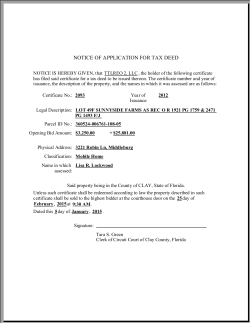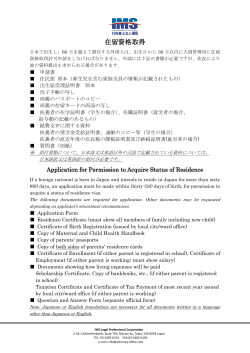
Legacy Public Health Certificate Programs
Legacy Public Health Certificate Programs **This page reflects the certificate requirements previous to June 1, 2015** The Edward J. Bloustein School of Planning and Public Policy offers a Long-Term Care Administration (LTCA) Certificate in conjunction with the public health major. The LTCA Certificate reduces the number of post-graduate hours required, and covers much of the material necessary for students to prepare for the state licensing examination. Long-Term Care Administration (24 Credits) The LTCA Certificate reduces the number of post-graduate hours required, and covers much of the material necessary for students to prepare for the state licensing examination. Students seeking the LTCA Certificate must apply to the public health major at the Edward J. Bloustein School of Planning and Public Policy. Once admitted to the Bloustein School as a student in good-standing, those interested in the LTCA Certificate Program will work with an adviser to plan for completing both the public health major and the LTCA Certificate requirements simultaneously Core Courses (21 credits) 01:832:341 Public Health and Aging (3) 10:832:333 Financial Aspects of Public Health (3) 10:832:334 Principles of Health Administration (3) 10:832:342 Long-Term Care Management (3) 10:832:356 Public Health Law and Ethics (3) 10:832:499 Internship in Public Health (LTCA placement only) * (6) Elective Credits (3 credits) 01:920:303 Social Gerontology * (3) 01:377:304 Exercise and Aging (3) 10:762:340 Aging and Public Policy (3) 10:832:332 Public Health Economics * (3) 11:709:255 Nutrition and Health (3) Independent study for elective credits may be applied if the student contracts with a faculty member knowledgeable about gerontology and/or health administration. *Course has prerequisites. Public Health Preparedness Certificate Program (15 credits) The Edward J. Bloustein School of Planning and Public Policy Undergraduate Programs Department in conjunction with the UMDNJ-School of Public Health offers a Public Health Preparedness (PHP) Certificate. Students are introduced to the biological, chemical and radiological agents that have the potential to cause widespread harm to public health; as well as emergency management concepts. The PHP certificate program is open to all majors and is only awarded with, or subsequent to, earning a bachelors degree. The Public Health Preparedness Certificate is comprised of 15 credits. Only courses with a grade of “C” or better may be applied toward the certificate program. Core Courses (15 credits) 10:832:232 Principles of Public Health (3) 10:832:335 Epidemiology (3) 10:832:437 Issues in Environmental and Occupational Health (3) or 10:832:483 Protecting Public Health and the Environment (3) or 10:762:483 Protecting Public Health and the Environment (3) 10:832:401 Public Health Preparedness I * (3) 10:832:402 Public Health Preparedness II (3) *A basic biology course is strongly recommended for this course. Public Health Education Certificate (15 credits) The Edward J. Bloustein School of Planning and Public Policy (EJBSPPP) offers a certificate program in Public Health Education (PHE) in conjunction with Rutgers University Health Services-Health Outreach, Promotion and Education. The PHE certificate helps students prepare for the national Certified Health Education Specialist (CHES) examination by covering the requisite material in a series of related courses. The certificate program is open to students in any major and is awarded only with or subsequent to earning a bachelor's degree. Only courses with grade of C or better may be applied toward the certificate program. The Public Health Education Certificate is comprised of 15 credits of (832) public health courses. Core Courses(12 credits) 10:832:242 Principles of Health and Wellness Education (3) or 10:832:241 Principles of Health Education (3) 10:832:352 Advanced Community Health Promotion (3) (prerequisite 10:832:242) 10:832:345 Health Program Development (3) 10:832:346 Health Program Evaluation (3) Elective Courses (3 credits) 10:832:301 Sexual Health Advocacy I (3) or 10:832:350 Drugs, Culture and Society (3) or 10:832:351 Addictions Policy (3) Addictions Prevention Certificate (15-18 credits) The Edward J. Bloustein School of Planning and Public Policy (EJBSPPP) offers a certificate program in Addictions Prevention (AP). The certificate covers the practice of substance abuse prevention strategies, programs, and services. It helps prepare students to take the International Certification and Reciprocity Consortium (IC&RC) Prevention Specialist examination. The certificate program is open to students in any major and is awarded with, or subsequent to, earning a bachelor's degree. Only courses with grade of C or better may be applied toward the certificate program. The Addictions Prevention Certificate is comprised of 18 credits of (832) public health courses. Course Requirements (18 credits) 10:832:350 Drugs, Culture, and Society (3) 10:832:351 Addictions Policy (3) 10:832:352 Advanced Community Health Promotion (3) 10:832:353 Science of Prevention (3) (prerequisite: 10:832:350) 10:832:499† Internship (832 majors only)** (6) or 10:832:400† Internship (762 majors only)** (3, 6) or 10:832:295† Internship (all other majors)** (3) † Course offered every semester. Requires at least 9 credits toward the certificate, including 10:832:350, and 100 credits toward graduation to register. ** Approved addictions prevention placement only. Public Health Administration Certificate (27 credits) The Public Health Administration (PHA) Certificate is offered by the Edward J. Bloustein School of Planning and Public Policy (EJBSPPP). The certificate provides core skills important for employment in public health and health care administration and covers much of the material necessary for students to prepare for graduate school in health administration. • Pre-baccalaureate students must be admitted to the EJBSPPP and complete the public health major. The coursework for the PHA certificate is embedded in major requirements and the student is awarded the certificate with the Bachelor of Science (BS) degree. • Students already holding a bachelor’s degree in a health-related field may complete the certificate as a post-baccalaureate student. • Students are urged to complete Intro to Accounting, Calculus I and Microeconomics as part of this certification, especially if planning to obtain a Master of Public Administration (MPA), Master of Health Services Administration (MHSA) or related degrees. The Public Health Administration Certificate is comprised of 27 credits, which consists of 21 credits of core courses, and 6 pre-approved elective credits. Core Required Courses (21 credits) 10:832:260 Health Care Systems (3) 10:832:332 Public Health Economics (3) or 01:220:316 Health Economics (3) † 10:832:333 Financial Aspects of Public Health (3) 10:832:334 Principles of Health Administration (3) 10:832:356 Public Health Law and Ethics (3) 10:832:499 Internship in Public Health (PHA placement only) (6) † Elective Credits (6 credits) 10:832:342 Long Term Care Management (3) 10:832:354 Health Care Organizational Marketing (3) 10:832:360 Principles of Public Management (3) 10:762:361 Managing People and Organizations (3) 10:832:362 Non-Profit Management (3) 10:832:363 Health Systems Operations(3) • Independent study for elective credits may be applied if the student contracts with a faculty member knowledgeable about aging and/or administration. • Public Health Administration certificate is available only to public health (832) majors. Certificates are awarded only with or subsequent to earning a bachelor’s degree. †Course has prerequisites
© Copyright 2025









